外研版九年级上册 Module 3 Heroes Unit 2 课件 (共26张PPT)
文档属性
| 名称 | 外研版九年级上册 Module 3 Heroes Unit 2 课件 (共26张PPT) |
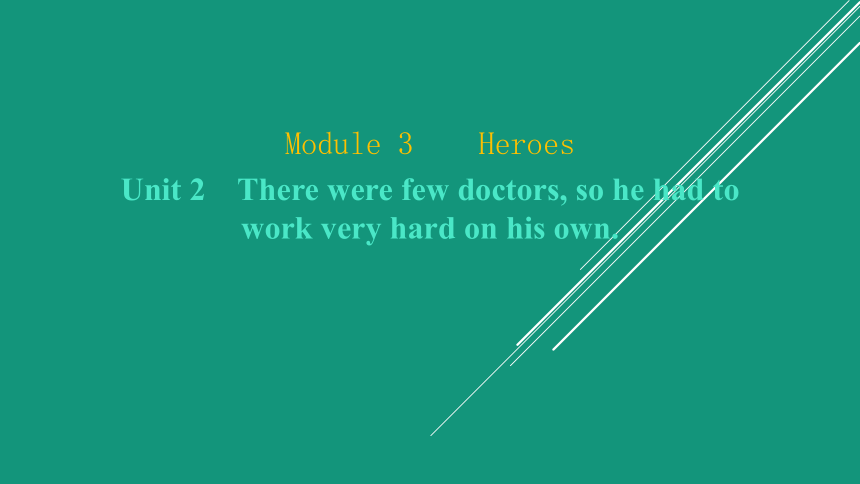
|
|
| 格式 | zip | ||
| 文件大小 | 2.7MB | ||
| 资源类型 | 教案 | ||
| 版本资源 | 外研版 | ||
| 科目 | 英语 | ||
| 更新时间 | 2022-11-06 21:08:01 | ||
图片预览

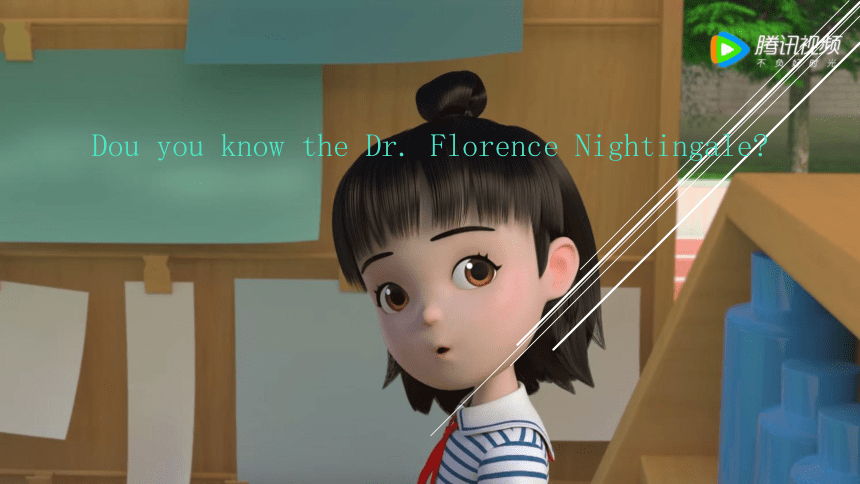
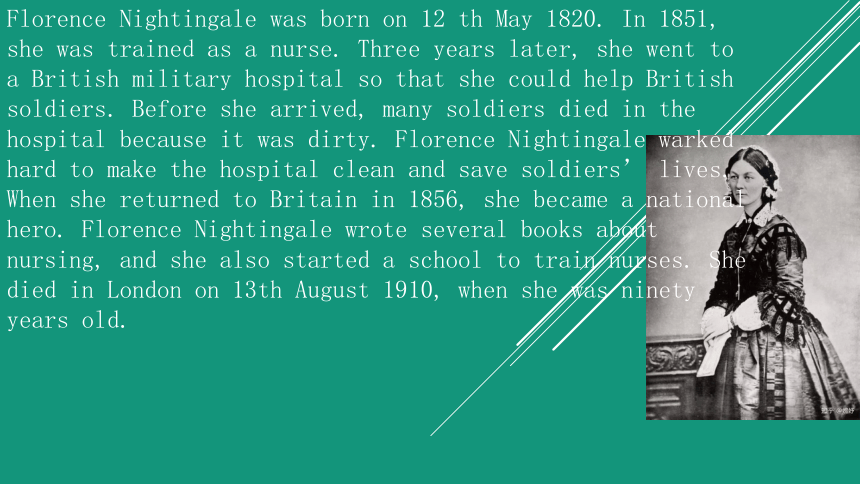
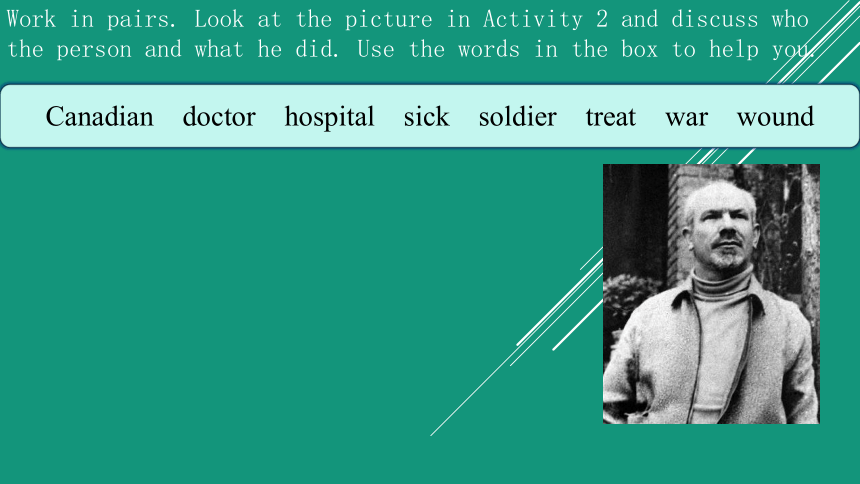
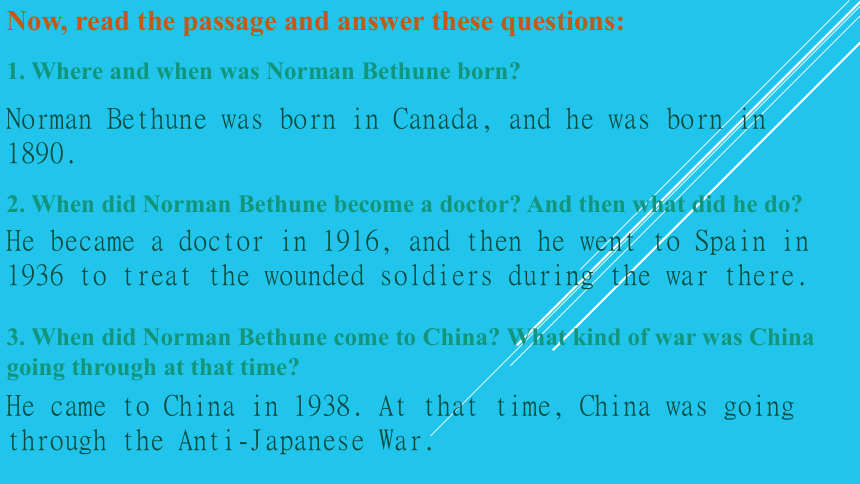
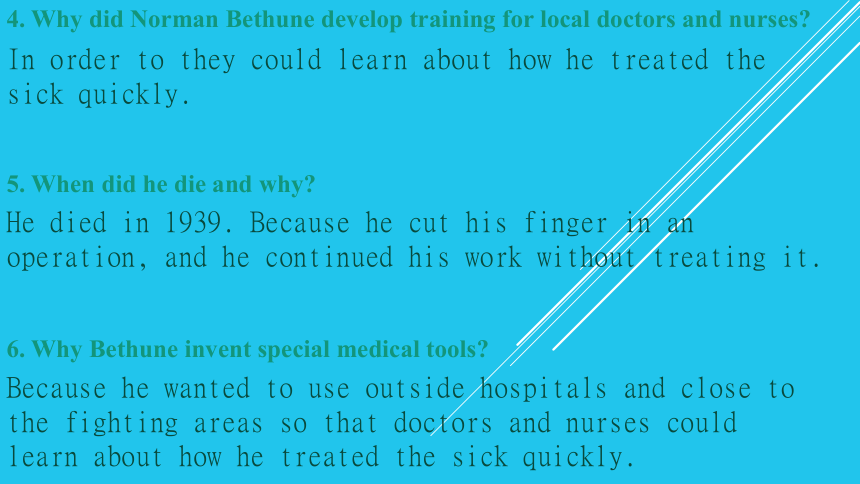
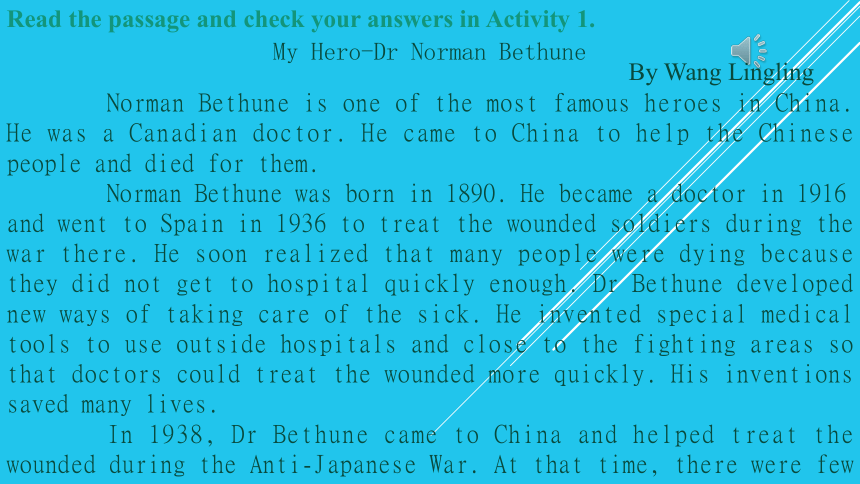
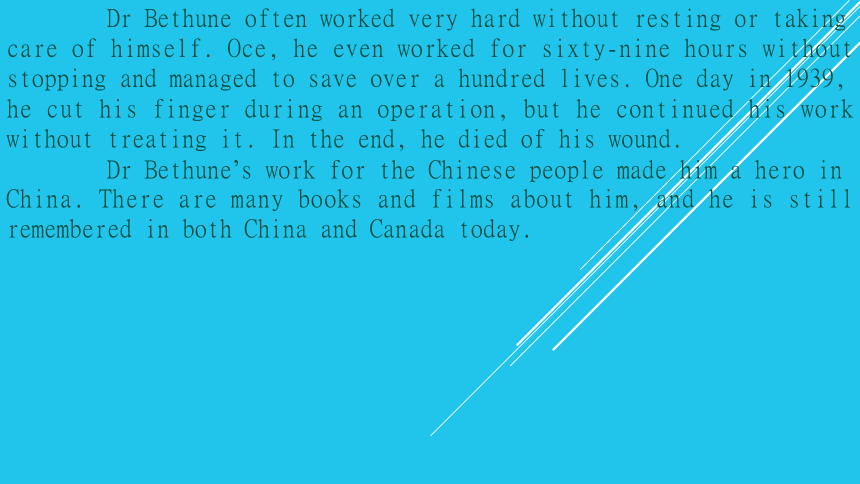
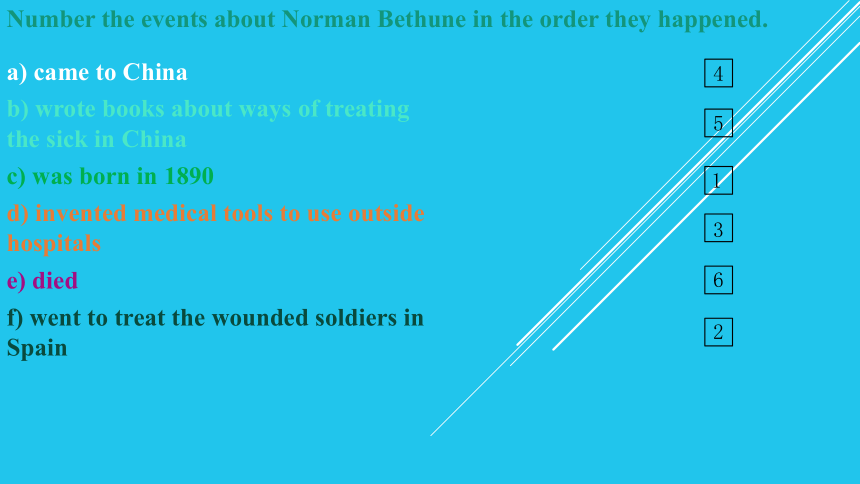
文档简介
(共26张PPT)
Module 3 Heroes
Unit 2 There were few doctors, so he had to work very hard on his own.
Dou you know the Dr. Florence Nightingale
Florence Nightingale was born on 12 th May 1820. In 1851, she was trained as a nurse. Three years later, she went to a British military hospital so that she could help British soldiers. Before she arrived, many soldiers died in the hospital because it was dirty. Florence Nightingale warked hard to make the hospital clean and save soldiers’ lives. When she returned to Britain in 1856, she became a national hero. Florence Nightingale wrote several books about nursing, and she also started a school to train nurses. She died in London on 13th August 1910, when she was ninety years old.
Work in pairs. Look at the picture in Activity 2 and discuss who the person and what he did. Use the words in the box to help you.
Canadian doctor hospital sick soldier treat war wound
Now, read the passage and answer these questions:
1. Where and when was Norman Bethune born
2. When did Norman Bethune become a doctor And then what did he do
3. When did Norman Bethune come to China What kind of war was China going through at that time
Norman Bethune was born in Canada, and he was born in 1890.
He became a doctor in 1916, and then he went to Spain in 1936 to treat the wounded soldiers during the war there.
He came to China in 1938. At that time, China was going through the Anti-Japanese War.
4. Why did Norman Bethune develop training for local doctors and nurses
5. When did he die and why
6. Why Bethune invent special medical tools
In order to they could learn about how he treated the sick quickly.
He died in 1939. Because he cut his finger in an operation, and he continued his work without treating it.
Because he wanted to use outside hospitals and close to the fighting areas so that doctors and nurses could learn about how he treated the sick quickly.
Read the passage and check your answers in Activity 1.
My Hero-Dr Norman Bethune
Norman Bethune is one of the most famous heroes in China. He was a Canadian doctor. He came to China to help the Chinese people and died for them.
Norman Bethune was born in 1890. He became a doctor in 1916 and went to Spain in 1936 to treat the wounded soldiers during the war there. He soon realized that many people were dying because they did not get to hospital quickly enough. Dr Bethune developed new ways of taking care of the sick. He invented special medical tools to use outside hospitals and close to the fighting areas so that doctors could treat the wounded more quickly. His inventions saved many lives.
In 1938, Dr Bethune came to China and helped treat the wounded during the Anti-Japanese War. At that time, there were few doctors, so he had to work very hard on his own. His experience of treating people in Spain was useful in China. He developed training courses for local doctors and nurses, and wrote books so that they could learn about how he treated the sick.
By Wang Lingling
Dr Bethune often worked very hard without resting or taking care of himself. Oce, he even worked for sixty-nine hours without stopping and managed to save over a hundred lives. One day in 1939, he cut his finger during an operation, but he continued his work without treating it. In the end, he died of his wound.
Dr Bethune’s work for the Chinese people made him a hero in China. There are many books and films about him, and he is still remembered in both China and Canada today.
Number the events about Norman Bethune in the order they happened.
a) came to China
b) wrote books about ways of treating the sick in China
c) was born in 1890
d) invented medical tools to use outside hospitals
e) died
f) went to treat the wounded soldiers in Spain
4
5
1
3
6
2
Complete the passage with the correct form of the words in the box.
Canadian continue himself invention manage sick tool war wound
Norman Bethune was (1) , but he is one of the most famous heroes in China. During the (2) in Spain, he treated the wounded the soldiers there. He invented special (3) to use outside hospitals. His (4) saved many lives. In China, he (5) to treat (6) and wounded soldiers. He often worked without taking a rest and did not look after (7) . At one point, he (8) to save over one hundred lives in sixty-nine hours. During an operation, he cut his finger, and finally died of his (9) . He is still remembered in both Chinan and Canada.
Canadian
war
tools
inventions
continued
sick
himself
managed
wound
Useful Phrases
1. 找到照顾病人的新方法
2. 接近战地
3. 医疗工具
4. 救命
5. 救治伤员
6. 那时候
7. 他独自一个人
8. 以便
develop new ways of taking care of the sick
close to the fighting areas
medical tools
save lives
treat the wounded
at that time
on his own
so that
9. 了解、学习
10. 为……而死
11. 想方设法做成某事
12. 最后
13. 死于
14. 使他成为英雄
15. 需要
16. 如此……以致于
learn about
die for…
manage to do sth.
in the end
die of
make him a hero
be in need of
so… that
17. 无论什么
whatever=no matter that
Language points
1. ...went to Spain in 1936 to treat the wounded soldiers during the war there. 1936年……到西班牙救治那些在战争中受伤的士兵们。
(1)treat 是及物动词。①意为“治疗;医治”。例如:
The doctors were not able to treat this disease. 医生治不了这种病。
②意为“看待;把……看作”,常用固定搭配为 treat A as B,意为“把 A 当作 B 看待”。例如:
We often treat dogs as our friends. 我们常把狗当作我们的好朋友。
(2)the wounded soldiers 意为“受伤的士兵们”。
1. I often Maths as English.
2. When we are ill, our parents always us.
treat
treat
2. He soon realised that many people were dying because they did not get to hospital quickly enough. 他很快意识到许多人陆续死亡,是因为他们没有足够快地前往医院。
(1)realize 意为 “意识到”,后常接 that 引导的宾语从句。
(2)dying 作形容词,意为 “垂死的,即将死亡的”。关于“死亡”的常见词有: die v. 死亡 dying adj. 垂死的 dead adj. 已死亡的
death n. 死亡
1. When I knew my exam results (bad) , I that effort is more important than results.
2. The dog was ill for a month, it is (die).
3. Dr Bethune (die) for Chinese people.
realised
dying
died
3. Dr Bethune developed new ways of taking care of the sick. 白求恩医生研究出了新方法照料病人。
(1)develop 在此意为“研究”。 develop 还有“发展;建立(友谊);培养(兴趣)”等意思。例如:
China is a developing country now and she will be a developed country 27 years later. 现在中国是一个发展中国家,27年后就会成为一个发达国家。
After class, he developed his interest in writing short stories. 课后,他培养了写短篇小说的兴趣。
(2)the sick 意为“病人”。“the+形容词”可以表示某一类的人,表示复数概念。当这个结构用作主语时,谓语动词用复数形式。例如:
The young have plenty of opportunities here. 年轻人在这里有充足的机会。
1. Children should their skills.
2. The (年轻的) should study hard.
develop
young
4. He invented special medical tools to use outside hospitals and close to the fighting areas so that doctors could treat the wounded more quickly. 他发明了适用于野外医院和战地医院的特殊医疗器械,以便医生能更快地医治受伤的士兵。
invent 是动词,意思是“发明”;它的名词形式是 invention,意思是“发明物”; inventor 意为“发明家”。
【辨析】invent 与 discover
invent 指经过思考、实验和研究等发明了以前从未存在过的新物品、新方法等。 discover 常指通过调查、实验等发现原已存在,但尚未被人了解、认识或挖掘的事物或真相等。例如:
A new coal mine was discovered in this district. 在这个地区(人们)发现了一座新煤矿。
Alexander Graham Bell invented the telephone in 1876. 1876年,亚历山大·格雷厄姆·贝尔发明了电话。
5. At that time, there were few doctors, so he had to work very hard on his own. 在那时,几乎没有医生,所以他不得不独自努力工作。
(1)at that time 意为“在那时”,常与一般过去时或者过去进行时连用,表示描述过去发生的事情。
(2)on one’s own 意为“独自地;独立地”,相当于 by oneself,常常置于句末作状语。
6. ...but he continued his work without treating it. ……但他没有处理伤口,仍然继续工作。
continue 意为“继续”。 continue to do sth “(做完手头上一件事后)继续做另外一件事”,指的是两件不同的事情。 continue doing sth 意为“继续做手头上正在做的这件事”,指的是同一件事情。例如:
I continued washing my clothes after drinking some water. 喝水之后,我继续洗衣服。(意思是喝水之前,“我”就在洗衣服)
I continued to wash my clothes after cleaning the room. 打扫完房间之后,我继续洗衣服。
7. In the end, he died of his wound. 最后,他因伤去世。
【辨析】die of, die from 与 die for
die of 意为“死于……”,一般用于表示死于人体自身的原因,如疾病、衰老等;die from 一般用于表示死于外界因素,如环境、事故等。 die for 意为 “为……而死”,后面常接人或者组织,表示目的。例如:
A little boy died of a serious illness last week. 上周一个小男孩死于一种严重的疾病。
Many people died from the big earthquake. 有许多人死于那次大地震。
It’s an honor to fight for our motherland. 为我们的祖国而战,是一件光荣的事情。
Practice
一、根据中文或首字母提示写出正确的单词。
1. You’d better put the ___________(工具) back after using it.
2. All people must learn from the past w and try their best to make peace.
3. After the eyes o , my grandfather can see things more clearly.
4. When we finish doing our homework, we should have a _________(休息).
5. The ____________(发明) of medical tools helps people a lot.
6. Through reading _________(有用的) books, we can get a lot of knowledge.
tool
ars
peration
rest
invention
useful
二、用括号中所给单词的正确形式填空。
1. Never give up! We can do many things on ____________(we) own.
2. The computer was a great ____________(invent) for modern society.
3. My foreign teacher is a ____________(Canada) and he teaches us English.
4. Doctors said that the sick girl might need an ____________(operate) at once.
5. The little boy managed ____________(draw) the picture.
our
invention
Canadian
operation
to draw
三、按要求写句子。
1. We have planted many trees. The trees will clean the air. (用 so that 连成一句)
________________________________________________________________
2. 我可以自己解决这个问题。(用 on one’s own 翻译句子)
______________________________________________________________
3. Dr Bethune developed training courses for local doctors and nurses so that they can learn about medical knowledge. (对画线部分提问)
___________________________________________________________________
4. Many doctors have to work for eight hours and don’t rest at all. (用 without 替换画线部分)
________________________________________________________________
We have planted many trees so that the trees will clean the air.
I can solve the problem in my own.
Why did Dr Bethune develope training courses for local doctors and nurses
Many doctors have to work for eight hours without having a rest.
5. She got the first prize. She always studied hard. (用 because 连成一句)
________________________________________________________________
She got the first prize because she always studied hard.
Thanks for watching!
Module 3 Heroes
Unit 2 There were few doctors, so he had to work very hard on his own.
Dou you know the Dr. Florence Nightingale
Florence Nightingale was born on 12 th May 1820. In 1851, she was trained as a nurse. Three years later, she went to a British military hospital so that she could help British soldiers. Before she arrived, many soldiers died in the hospital because it was dirty. Florence Nightingale warked hard to make the hospital clean and save soldiers’ lives. When she returned to Britain in 1856, she became a national hero. Florence Nightingale wrote several books about nursing, and she also started a school to train nurses. She died in London on 13th August 1910, when she was ninety years old.
Work in pairs. Look at the picture in Activity 2 and discuss who the person and what he did. Use the words in the box to help you.
Canadian doctor hospital sick soldier treat war wound
Now, read the passage and answer these questions:
1. Where and when was Norman Bethune born
2. When did Norman Bethune become a doctor And then what did he do
3. When did Norman Bethune come to China What kind of war was China going through at that time
Norman Bethune was born in Canada, and he was born in 1890.
He became a doctor in 1916, and then he went to Spain in 1936 to treat the wounded soldiers during the war there.
He came to China in 1938. At that time, China was going through the Anti-Japanese War.
4. Why did Norman Bethune develop training for local doctors and nurses
5. When did he die and why
6. Why Bethune invent special medical tools
In order to they could learn about how he treated the sick quickly.
He died in 1939. Because he cut his finger in an operation, and he continued his work without treating it.
Because he wanted to use outside hospitals and close to the fighting areas so that doctors and nurses could learn about how he treated the sick quickly.
Read the passage and check your answers in Activity 1.
My Hero-Dr Norman Bethune
Norman Bethune is one of the most famous heroes in China. He was a Canadian doctor. He came to China to help the Chinese people and died for them.
Norman Bethune was born in 1890. He became a doctor in 1916 and went to Spain in 1936 to treat the wounded soldiers during the war there. He soon realized that many people were dying because they did not get to hospital quickly enough. Dr Bethune developed new ways of taking care of the sick. He invented special medical tools to use outside hospitals and close to the fighting areas so that doctors could treat the wounded more quickly. His inventions saved many lives.
In 1938, Dr Bethune came to China and helped treat the wounded during the Anti-Japanese War. At that time, there were few doctors, so he had to work very hard on his own. His experience of treating people in Spain was useful in China. He developed training courses for local doctors and nurses, and wrote books so that they could learn about how he treated the sick.
By Wang Lingling
Dr Bethune often worked very hard without resting or taking care of himself. Oce, he even worked for sixty-nine hours without stopping and managed to save over a hundred lives. One day in 1939, he cut his finger during an operation, but he continued his work without treating it. In the end, he died of his wound.
Dr Bethune’s work for the Chinese people made him a hero in China. There are many books and films about him, and he is still remembered in both China and Canada today.
Number the events about Norman Bethune in the order they happened.
a) came to China
b) wrote books about ways of treating the sick in China
c) was born in 1890
d) invented medical tools to use outside hospitals
e) died
f) went to treat the wounded soldiers in Spain
4
5
1
3
6
2
Complete the passage with the correct form of the words in the box.
Canadian continue himself invention manage sick tool war wound
Norman Bethune was (1) , but he is one of the most famous heroes in China. During the (2) in Spain, he treated the wounded the soldiers there. He invented special (3) to use outside hospitals. His (4) saved many lives. In China, he (5) to treat (6) and wounded soldiers. He often worked without taking a rest and did not look after (7) . At one point, he (8) to save over one hundred lives in sixty-nine hours. During an operation, he cut his finger, and finally died of his (9) . He is still remembered in both Chinan and Canada.
Canadian
war
tools
inventions
continued
sick
himself
managed
wound
Useful Phrases
1. 找到照顾病人的新方法
2. 接近战地
3. 医疗工具
4. 救命
5. 救治伤员
6. 那时候
7. 他独自一个人
8. 以便
develop new ways of taking care of the sick
close to the fighting areas
medical tools
save lives
treat the wounded
at that time
on his own
so that
9. 了解、学习
10. 为……而死
11. 想方设法做成某事
12. 最后
13. 死于
14. 使他成为英雄
15. 需要
16. 如此……以致于
learn about
die for…
manage to do sth.
in the end
die of
make him a hero
be in need of
so… that
17. 无论什么
whatever=no matter that
Language points
1. ...went to Spain in 1936 to treat the wounded soldiers during the war there. 1936年……到西班牙救治那些在战争中受伤的士兵们。
(1)treat 是及物动词。①意为“治疗;医治”。例如:
The doctors were not able to treat this disease. 医生治不了这种病。
②意为“看待;把……看作”,常用固定搭配为 treat A as B,意为“把 A 当作 B 看待”。例如:
We often treat dogs as our friends. 我们常把狗当作我们的好朋友。
(2)the wounded soldiers 意为“受伤的士兵们”。
1. I often Maths as English.
2. When we are ill, our parents always us.
treat
treat
2. He soon realised that many people were dying because they did not get to hospital quickly enough. 他很快意识到许多人陆续死亡,是因为他们没有足够快地前往医院。
(1)realize 意为 “意识到”,后常接 that 引导的宾语从句。
(2)dying 作形容词,意为 “垂死的,即将死亡的”。关于“死亡”的常见词有: die v. 死亡 dying adj. 垂死的 dead adj. 已死亡的
death n. 死亡
1. When I knew my exam results (bad) , I that effort is more important than results.
2. The dog was ill for a month, it is (die).
3. Dr Bethune (die) for Chinese people.
realised
dying
died
3. Dr Bethune developed new ways of taking care of the sick. 白求恩医生研究出了新方法照料病人。
(1)develop 在此意为“研究”。 develop 还有“发展;建立(友谊);培养(兴趣)”等意思。例如:
China is a developing country now and she will be a developed country 27 years later. 现在中国是一个发展中国家,27年后就会成为一个发达国家。
After class, he developed his interest in writing short stories. 课后,他培养了写短篇小说的兴趣。
(2)the sick 意为“病人”。“the+形容词”可以表示某一类的人,表示复数概念。当这个结构用作主语时,谓语动词用复数形式。例如:
The young have plenty of opportunities here. 年轻人在这里有充足的机会。
1. Children should their skills.
2. The (年轻的) should study hard.
develop
young
4. He invented special medical tools to use outside hospitals and close to the fighting areas so that doctors could treat the wounded more quickly. 他发明了适用于野外医院和战地医院的特殊医疗器械,以便医生能更快地医治受伤的士兵。
invent 是动词,意思是“发明”;它的名词形式是 invention,意思是“发明物”; inventor 意为“发明家”。
【辨析】invent 与 discover
invent 指经过思考、实验和研究等发明了以前从未存在过的新物品、新方法等。 discover 常指通过调查、实验等发现原已存在,但尚未被人了解、认识或挖掘的事物或真相等。例如:
A new coal mine was discovered in this district. 在这个地区(人们)发现了一座新煤矿。
Alexander Graham Bell invented the telephone in 1876. 1876年,亚历山大·格雷厄姆·贝尔发明了电话。
5. At that time, there were few doctors, so he had to work very hard on his own. 在那时,几乎没有医生,所以他不得不独自努力工作。
(1)at that time 意为“在那时”,常与一般过去时或者过去进行时连用,表示描述过去发生的事情。
(2)on one’s own 意为“独自地;独立地”,相当于 by oneself,常常置于句末作状语。
6. ...but he continued his work without treating it. ……但他没有处理伤口,仍然继续工作。
continue 意为“继续”。 continue to do sth “(做完手头上一件事后)继续做另外一件事”,指的是两件不同的事情。 continue doing sth 意为“继续做手头上正在做的这件事”,指的是同一件事情。例如:
I continued washing my clothes after drinking some water. 喝水之后,我继续洗衣服。(意思是喝水之前,“我”就在洗衣服)
I continued to wash my clothes after cleaning the room. 打扫完房间之后,我继续洗衣服。
7. In the end, he died of his wound. 最后,他因伤去世。
【辨析】die of, die from 与 die for
die of 意为“死于……”,一般用于表示死于人体自身的原因,如疾病、衰老等;die from 一般用于表示死于外界因素,如环境、事故等。 die for 意为 “为……而死”,后面常接人或者组织,表示目的。例如:
A little boy died of a serious illness last week. 上周一个小男孩死于一种严重的疾病。
Many people died from the big earthquake. 有许多人死于那次大地震。
It’s an honor to fight for our motherland. 为我们的祖国而战,是一件光荣的事情。
Practice
一、根据中文或首字母提示写出正确的单词。
1. You’d better put the ___________(工具) back after using it.
2. All people must learn from the past w and try their best to make peace.
3. After the eyes o , my grandfather can see things more clearly.
4. When we finish doing our homework, we should have a _________(休息).
5. The ____________(发明) of medical tools helps people a lot.
6. Through reading _________(有用的) books, we can get a lot of knowledge.
tool
ars
peration
rest
invention
useful
二、用括号中所给单词的正确形式填空。
1. Never give up! We can do many things on ____________(we) own.
2. The computer was a great ____________(invent) for modern society.
3. My foreign teacher is a ____________(Canada) and he teaches us English.
4. Doctors said that the sick girl might need an ____________(operate) at once.
5. The little boy managed ____________(draw) the picture.
our
invention
Canadian
operation
to draw
三、按要求写句子。
1. We have planted many trees. The trees will clean the air. (用 so that 连成一句)
________________________________________________________________
2. 我可以自己解决这个问题。(用 on one’s own 翻译句子)
______________________________________________________________
3. Dr Bethune developed training courses for local doctors and nurses so that they can learn about medical knowledge. (对画线部分提问)
___________________________________________________________________
4. Many doctors have to work for eight hours and don’t rest at all. (用 without 替换画线部分)
________________________________________________________________
We have planted many trees so that the trees will clean the air.
I can solve the problem in my own.
Why did Dr Bethune develope training courses for local doctors and nurses
Many doctors have to work for eight hours without having a rest.
5. She got the first prize. She always studied hard. (用 because 连成一句)
________________________________________________________________
She got the first prize because she always studied hard.
Thanks for watching!
同课章节目录
- Module 1 Wonders of the world
- Unit 1 It's more than 2,000 years old.
- Unit 2 The Grand Canyon was not just big.
- Unit 3 Language in use
- Module 2 Public holidays
- Unit 1 My family always go somewhere interesting a
- Unit 2 We have celebrated the festival since the f
- Unit 3 Language in use
- Module 3 Heroes
- Unit 1 She trained hard,so she became a great play
- Unit 2There were few doctors, so he had to work ve
- Unit 3 Language in use
- Module 4 Home alone
- Unit 1 I can look after myself, although it won’t
- Unit 2 I became so bored with their orders that I
- Unit 3 Language in use
- Module 5 Museums
- Unit 1 Don't cross that rope!
- Unit 2 If you ever go to London, make sure you vis
- Unit 3 Language in use
- Module 6 Problems
- Unit 1 If I start after dinner, I'll finish it be
- Unit 2 If you tell him the truth now, you will sho
- Unit 3 Language in use
- Revision Module A
- Module 7 Great books
- Unit 1 We're still influenced by Confucius's idea
- Unit 2 It is still read and loved.
- Unit 3 Language in use
- Module 8 Sports life
- Unit 1 Daming wasn't chosen for the team last time
- Unit 2 He was invited to competitions around the w
- Unit 3 Language in use
- Module 9 Great inventions
- Unit 1 Will computers be used more than books in t
- Unit 2 Will books be replaced by the Internet?
- Unit 3 Language in use
- Module 10 Australia
- Unit 1 I have some photos that I took in Australia
- Unit 2 The game that they like most is Australian
- Unit 3 Language in use
- Module 11 Photos
- Unit 1 He's the boy who won the photo competition
- Unit 2 The photo which we liked best was taken by
- Unit 3 Language in use
- Module 12 Save our world
- Unit 1 If everyone starts to do something, the wor
- Unit 2 Repeat these three words daily: reduce, reu
- Unit 3 Language in use
- Revision Module B
